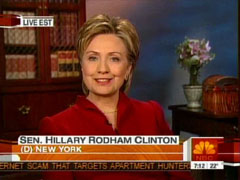By 20-to-1, Nets Apply Ideological Labels to Republicans Over Democratic Presidential Candidates
This year's crop of GOP presidential candidates includes strong conservatives, just like the top Democratic candidates four years ago — Barack Obama, Hillary Clinton and John Edwards — were all staunch liberals. But a major, glaring difference between today's campaign coverage and the early coverage of the 2007 Democratic nomination race is the impulse of journalists to repeatedly brand the 2012 GOP candidates as 'conservative' despite offering extremely few 'liberal' labels four years ago.
Media Research Center analysts reviewed the ABC, CBS and NBC morning and evening news programs from January 1 through July 31 and found 62 'conservative' labels for Republican candidates or those talked about as potential candidates. A check of the same broadcasts for the same time period in 2007 found a paltry three "liberal" labels for the Democrats running that year, a greater than 20-to-1 disparity.
In fact, reporters four years ago used the "liberal" label more freely with Republican candidates than Democrats. ABC's Jake Tapper (World News, March 5, 2007) called Rudy Giuliani a "former big city mayor with liberal views on abortion, gay rights, and gun control." But Democratic candidates such as Edwards and Clinton, whose views were to the left of Giuliani, were not once called "liberal" on any of the networks during the period we examined, while CBS and NBC never tagged Barack Obama as liberal.
With this year's crop of Republicans, however, the networks aren't being nearly as stingy with the ideological labels. On the March 22 edition of NBC's Today, for example, Natalie Morales told viewers about former Minnesota Governor Tim Pawlenty's candidacy: "The 50-year-old conservative announced on Facebook Monday that he was forming an exploratory committee...."
On the June 13 Early Show, correspondent Jan Crawford called former Senator Rick Santorum the "strongest social conservative in the bunch."
ABC's John Hendren, on the May 14 Good Morning America, described former House Speaker Newt Gingrich as "a conservative's conservative who last held office when Seinfeld was a hit TV show and Michael Jackson was still on tour." That night, Hendren revised his script for ABC's World News to describe Gingrich as "a family values conservative who's had three wives since he last held office...."
Rick Perry, according to Ron Claiborne on the May 28 Good Morning America, "has strong conservative credentials." On the June 27 Good Morning America, reporter Jonathan Karl described Congresswoman Michele Bachmann as a "take-no-prisoners conservative." Earlier, on the May 27 World News, he compared Bachmann with former Alaska Governor Sarah Palin: "Politically, they appear to be soul mates — unbending conservatives who fire up Tea Partiers like no other Republicans."

Indeed, the most-labeled candidate this cycle is Michele Bachmann, who accounted for more than a third (23) of the ideological descriptions we tallied. On ABC's World News on June 14, correspondent John Berman called Bachmann "one of Congress's most conservative members." Later that month, ABC's Jon Karl described Bachmann as having "unyieldingly conservative views" (June 26) and as an "uncompromising conservative" (June 27). Over on the CBS Evening News, Jan Crawford tagged Bachmann as "unapologetically conservative" (June 26).
On the June 27 NBC Nightly News, correspondent Kelly O'Donnell said Bachmann was "known for her firebrand conservative style." The next morning on Today, co-host Matt Lauer asked Bachmann: "Are you at all concerned that your socially conservative views, that make you very popular in Iowa, might not play as well down the road?"
Four years ago, former North Carolina Senator John Edwards espoused the most stridently liberal positions of the major Democratic candidates, but drew no liberal labels from January 1 through July 31, 2007. (Then-NBC reporter Chip Reid, however, did supply a single liberal label on the December 28, 2006 edition of Today, as Edwards prepared to announce his candidacy: "Critics say Edwards is too liberal and, with just one term in the Senate, too inexperienced.")
Viewers only heard two liberal labels for then-Senator Barack Obama, who, like Edwards, espoused strongly liberal positions as a candidate. The labels came in a single flattering story by ABC's Jake Tapper that was aired both on the January 16, 2007 World News and the next morning's Good Morning America: "Obama has drawn raves for presenting fairly traditional liberal views as fresh and inspiring..."

As for then-New York Senator Hillary Clinton, who led the Democratic field throughout 2007, she was also never termed a liberal. In fact, network analysts busied themselves refuting the notion. "People think she's a liberal, even though she's hawkish," MSNBC's Chris Matthews asserted on NBC's Today on January 15, 2007.
The only other "liberal" label in 2007 was assigned to then-Democratic candidate Chris Dodd, referred to by NBC Nightly News correspondent John Yang on February 4, 2007 as part of "a small group of liberal Democrats" who wanted to cut off Iraq war funding to block President Bush's proposed troop surge. For its part, CBS failed to attach a single liberal label to the Democratic candidates during the first seven months of 2007.
It's neither inaccurate nor impolite to describe this year's GOP candidates as "conservative" — most of them wear the label proudly. But if the networks are going to treat both sides fairly, they should have been just as ardent in pointing out the liberalism of the Democratic field that produced the most liberal President in American history.



